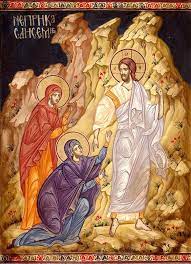HOMILY SATURDAY of EASTER WEEK
On Being Missionary Disciples
(Acts 4:13-21; Ps 118; Mk 16:9-15)
**********************************************
Two themes continue to dominate the readings after Easter: faith in the Risen Lord, and the commission to go and proclaim the Good News.
These two themes synchronize precisely with two dominant themes of the papacy of Pope Francis: the disciple is one who has had a personal encounter with the Risen Lord, and who cannot help but share that good news with others.
The gospel begins with a focus on faith in Jesus as the Risen Lord. It is interesting that Mark, like the other evangelists, stresses that Jesus rose early on the first day of the week. That is because for all of them, the resurrection of Jesus is a brand-new creation, a new world order.
The reason Jesus appears to Mary Magdalene first is probably because she, of all his disciples, received his forgiveness and healing the most. She was not only forgiven her past sins, but also was healed of seven demons. Whatever they were, she was the woman in the gospels who had been forgiven and healed the most and now was able to show much love, so it would be natural for Jesus to appear to her first.
 What we see next is unbelief on the part of the other disciples, who stubbornly refuse to believe Mary as well as the disciples who encountered Jesus on the road to Emmaus. Jesus finally has to appear to them and upbraid them for their lack of faith and stubbornness – just like their ancestors. However, he forgives them and slides right into the second theme of Easter – the commission to proclaim the Good News.
What we see next is unbelief on the part of the other disciples, who stubbornly refuse to believe Mary as well as the disciples who encountered Jesus on the road to Emmaus. Jesus finally has to appear to them and upbraid them for their lack of faith and stubbornness – just like their ancestors. However, he forgives them and slides right into the second theme of Easter – the commission to proclaim the Good News.
That theme is what the first reading is all about. Peter and John were imprisoned for healing a man in the name of Jesus. In fact, the religious leaders who arrested them had to admit Peter and John had performed a “notable sign” which is a reminder of the many signs Jesus performed in the gospel of John.
When commanded not to preach or teach in the name of Jesus again, they respond it is better to listen to God than to listen to these leaders, and also, they simply could not keep from “speaking about what we have seen and heard.” What a powerful example of missionary disciples they are for us.
In fact, that is exactly the stance that Pope Francis takes when he speaks of missionary discipleship. Once again, a disciple for him is one who has had a personal experience of Jesus Christ and does not need a lot of training or education to simply go out and share that experience with others.
We can always trust in the power of the Holy Spirit that brought the apostles’ faith to life, now living in us. That Spirit can persuade us that the risen Christ has the power to change our life. The Spirit can give us the boldness to pray with a friend who is sick or encouraging words to share with someone struggling with doubt. God delights in using ordinary people – like us.
Pope Francis writes, “I invite all Christians, everywhere, at this very moment, to a renewed personal encounter with Jesus Christ, or at least an openness to letting him encounter them; I ask all of you to do this unfailingly each day. No one should think this invitation is not meant for him or her, since no one is excluded from the joy brought by the Lord.” Pope Francis goes on to say, “For if we have received the love which restores meaning to our lives, how can we fail to share that love with others?”
That love flows out of the Good News of Jesus Christ. That Good News is: the Old Testament prophecies have all been fulfilled; the Messiah has come; Jesus is risen from the dead; death and sin have been overcome; through genuine repentance we can be forgiven all our sins, and even better, we can be transformed like the apostles, by being healed of all our painful emotions and defects of character like unbelief and stubbornness. And we can boldly proclaim this because of the resurrection of Jesus overcoming death itself, and none of our sins and defects are stronger than death.
The Eucharist is itself an event in which we encounter the Risen Lord – through his Word, receiving His Body and Blood and through our fellowship with one another. Actually, the primary presence of Jesus in a celebration of the Eucharist is not in the host or in the tabernacle – it is in the person next to you. That is the challenge – it is much easier to recognize Jesus in the first two modes than in a person we may not like but are called to love.
May our celebration deepen our encounter with Jesus as Risen Lord, help us recognize him in one another, and empower us to go out as missionary disciples to manifest our faith in Jesus Christ.



